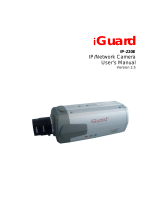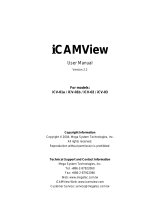Page is loading ...

3C855 OfficeConnect Cable/DSL Gateway
General FAQs
How do I connect my Cable/DSL line to this device?
The OfficeConnect Cable/DSL Gateway does not have an internal Cable or
DSL modem and will therefore not connect directly to your Cable or DSL line.
It is designed to connect to the Ethernet output from your Cable or DSL
modem. An Ethernet cable is supplied with the product for this purpose.
Why do I want to use your Cable/DSL Gateway instead of just using the
product supplied by my service provider?
The modem that your service provider has supplied is designed to provide
Internet access for one PC.
The OfficeConnect Cable/DSL Gateway allows multiple computers to share
this connection simultaneously, with major associated cost savings, and
increase the security of your network by the addition of the firewall included in
the OfficeConnect Cable/DSL Gateway.
My Service Provider only allows one computer to access the broadband
connection. They know the address of the computer. Can I get around
this?
The OfficeConnect Cable/DSL Gateway has the ability to clone the MAC
address of the “allowed” PC. All communications from the computers behind
the Gateway will appear to originate from this MAC address.
As you have a separate Internet Firewall Family, does that mean the
Cable/DSL Gateway has no security protection?
The OfficeConnect Internet Firewalls do offer the highest security for a
network including Stateful Packet Inspection (the latest firewall technology).
However, the Cable/DSL Gateway uses Network Address Translation and
Denial of Service Prevention to provide excellent security to the network. (See
table below for full description)

How is the OfficeConnect Cable/DSL Gateway different from your
existing Internet Firewall products?
The following table details the feature sets of both the OfficeConnect
Cable/DSL Gateway and the OfficeConnect Internet Firewall Family
OC Gateway
Internet
Firewall 25
Internet
Firewall DMZ
No users supported 253 25 100
Number of LAN ports 4 1 1
LAN port speed 10/100M 10M 10M
Auto MDI/X on LAN ports Y N N
WAN port speed 10M 10M 10M
Auto MDI/X on WAN port N N N
LAN/WAN
Physical DMZ port N N Y
Stateful Packet Inspection N Y Y
ICSA certified/compliant N Y Y
Virtual Server Support Y Y Y
Firewall
Special Application Support Y N N
Set-up Wizard Y Y Y
MAC Address Cloning Y N N
Special Application Support Y N N
PC Access Privileges Y N N
Features
Internet Content Filtering N Y Y
VPN pass thru (IPSec, PPTP) Y Y Y
VPN
VPN intiation/termination N Y* Y*
* Additional Upgrade Required
I have 30 users in my network -- how can I use your gateway with only
four LAN ports?
The OfficeConnect Cable/DSL Gateway Family can support up to 253 users.
The four LAN ports on the OfficeConnect Cable/DSL Gateway can be
connected to additional switches and hubs to extend the network and the
number of users. Additional switches and hubs must be purchased
separately.
What is Network Address Translation?
Network Address Translation is a method of hiding a network so that all data
being passed out of the network appears to come from one computer. This
adds a level of security to your network and also allows great cost savings as
multiple computers can share one public address on the Internet.

What is DHCP?
DHCP stands for Dynamic Host Configuration Protocol and is a way of
centrally controlling the addresses on your network. A computer (if DHCP is
enabled) will automatically obtain an address from the DHCP server and is
ready to access the network. The OfficeConnect Cable/DSL Gateway has a
built-in DHCP server to allocate IP addresses to the local network. No user
intervention is required.
What is VPN?
VPN stands for Virtual Private Network and is a means of securely
transmitting private data over a public network (like the Internet). This is
achieved by encrypting the data so that only the sender and the recipient can
decode the data. The OfficeConnect Cable/DSL Gateway allows the pass
through of VPN data so that a secure tunnel can be set-up through the
Gateway.
What are PC Privileges?
PC Privileges allow the network administrator to specify, which services are
allowed to be access by each PC or group of PCs on the local network are
allowed to access. For example, it might be necessary to block all Web and
FTP traffic from a group of PCs. This is easily achieved through the
management interface simply by clicking checkboxes.
What are Special Applications?
Some PC applications use more than one connection to communicate across
the Internet. These applications will not normally pass-through a firewall.
However, using the Special Applications feature it is possible to configure the
gateway to pass through the traffic.
A list of well-known Special Applications are pre-defined in the OfficeConnect
Cable/DSL Gateway and by selecting from a pull-down menu the selected
application is enabled. It is also possible for the user to define new Special
Applications if required.
What is a “Virtual Server”?
A Virtual Server is a computer on the local network, behind the gateway, that
has to be publicly accessible (e.g. Web Server, FTP Server etc). A Virtual
Server can be set-up simply by entering the last digit of the IP address of the
Virtual Server computer and selecting the service to be allowed through to the
computer. All traffic on the service will then be sent directly to the defined
Virtual Server. In this way, you are able to host Internet services from your
private network.
What is a Virtual DMZ?
A Virtual DMZ (De-Militarized Zone) is basically a group Virtual Server. All
traffic that has not already been directed to a specific Virtual Server can be
sent to a computer on the local network defined as the Virtual DMZ. A Virtual
DMZ might be used when an application that uses a very large number of
connections is being used, or an application where the port numbers of the
simultaneous connections are not known or are assigned dynamically.
/




